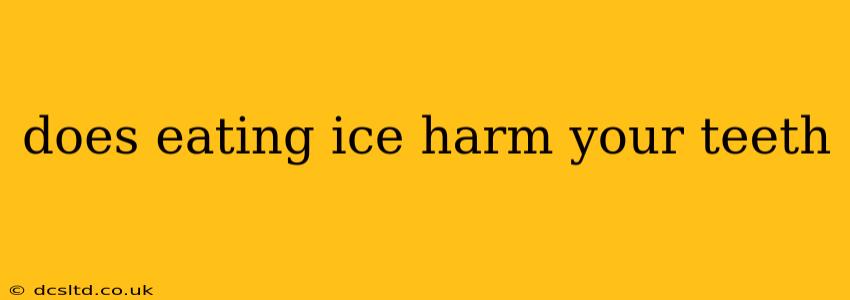Many of us enjoy the refreshing crunch of ice, especially on a hot day. But does this seemingly innocent habit pose a risk to our dental health? The short answer is: yes, it can. While an occasional ice cube likely won't cause significant damage, regularly consuming ice can lead to various dental problems. Let's delve into the details.
How Does Eating Ice Damage Teeth?
The primary concern is the sheer hardness of ice. Your teeth, while strong, are not indestructible. Repeatedly chewing on ice can cause:
- Cracks and chips: The force exerted on your teeth when biting down on ice can create microscopic cracks or even visible chips. These imperfections weaken your teeth, making them more susceptible to cavities and further damage.
- Enamel erosion: The enamel, the hard outer layer of your teeth, is the body's hardest substance. However, it's not impervious to damage. The abrasive nature of ice can gradually wear away the enamel, leaving your teeth vulnerable to sensitivity, decay, and discoloration.
- Fractures: In severe cases, chewing ice can lead to more serious fractures or even the complete breakage of a tooth. This is especially true for those with pre-existing dental issues like weakened enamel or fillings.
What are the Signs of Ice-Related Tooth Damage?
Recognizing the early signs of ice-induced tooth damage is crucial for timely intervention. Look out for:
- Increased tooth sensitivity: Experiencing pain or discomfort when consuming hot, cold, or sweet foods and drinks is a common indicator of enamel erosion.
- Visible cracks or chips: Check your teeth regularly in a mirror for any signs of damage.
- Discoloration: Worn-down enamel can expose the dentin, the underlying layer of your teeth, leading to discoloration or yellowing.
- Pain or discomfort when chewing: If chewing becomes uncomfortable, it could signal underlying damage.
Is it Only Ice That Damages Teeth?
While ice is a significant culprit, other hard substances like nutshells, hard candies, and even biting on pens or pencils can cause similar damage. Avoiding all hard objects is not realistic, but practicing moderation and mindful chewing habits is essential.
What Can I Do to Protect My Teeth?
If you enjoy chewing ice, consider these preventative measures:
- Reduce your ice consumption: Moderation is key. Try to limit your intake of ice cubes.
- Choose softer alternatives: Satisfy your craving for a cold treat with ice pops or frozen yogurt.
- Maintain good oral hygiene: Regular brushing, flossing, and dental checkups are crucial for maintaining healthy teeth and detecting potential problems early on.
Can I Repair Ice Damage to My Teeth?
Unfortunately, once enamel is eroded, it cannot regenerate naturally. However, depending on the extent of the damage, your dentist can offer restorative treatments such as:
- Bonding: To repair minor chips and cracks.
- Fillings: To restore damaged areas.
- Crowns: For more extensive damage.
Early intervention is essential, so promptly seek professional dental care if you notice any signs of tooth damage.
How Often Should I See a Dentist?
Regular dental checkups, ideally every six months, are vital for detecting and addressing potential dental problems, including those caused by ice chewing. Your dentist can assess your teeth, provide professional cleaning, and advise on necessary preventative measures.
Why is Enamel Important for Tooth Health?
Enamel is the protective outer layer of your teeth. Its hardness shields the underlying dentin and tooth pulp from decay and damage. Maintaining healthy enamel is essential for long-term oral health. Erosion or damage to the enamel compromises this protection, leading to increased sensitivity and susceptibility to cavities.
In conclusion, while the occasional ice cube is unlikely to cause significant harm, the habit of regularly chewing on ice can lead to various dental problems. By being mindful of your chewing habits and practicing good oral hygiene, you can protect your teeth and maintain a healthy smile for years to come. Remember to consult your dentist if you have any concerns about your teeth's health.
